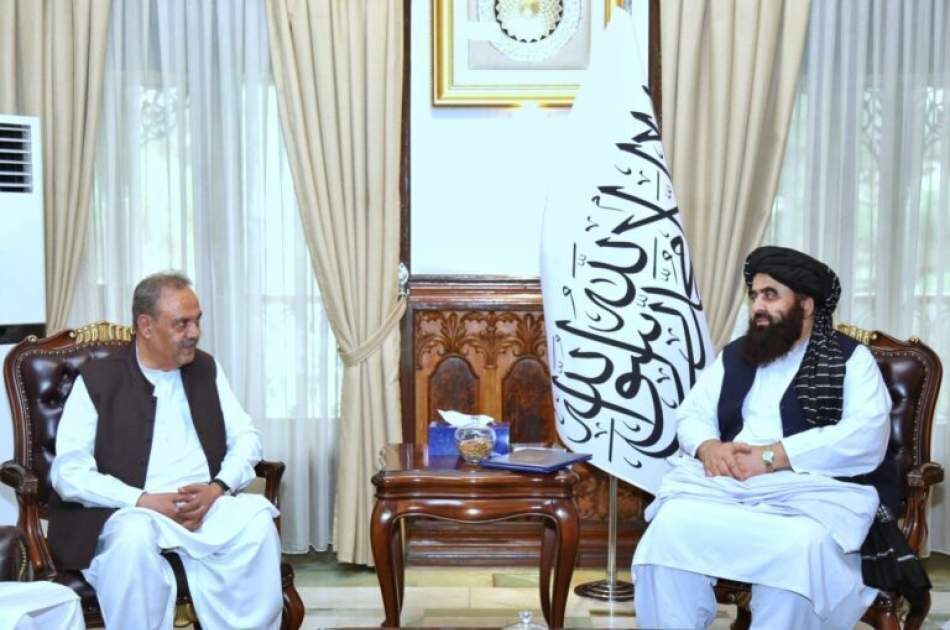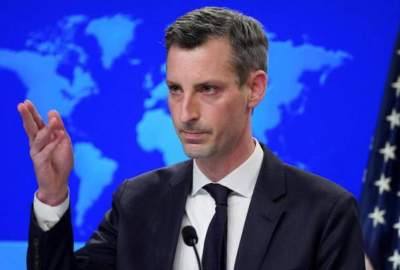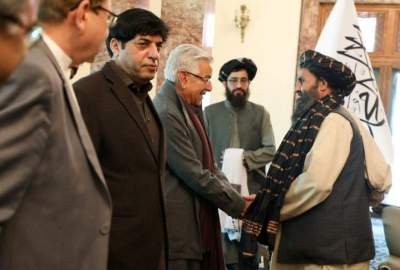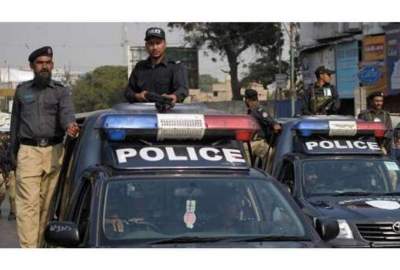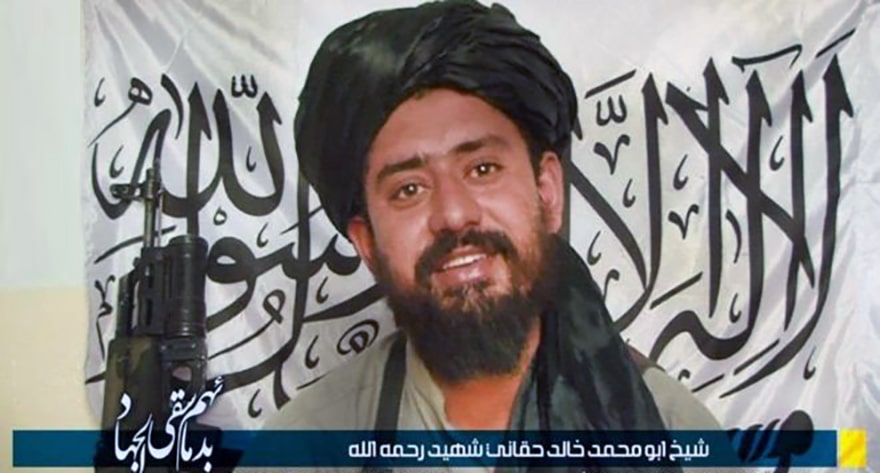Political experts say that the purpose of the visit of Pakistan's special representative for Afghanistan affairs to Kabul is to share the government's concerns about the presence of the Pakistani Taliban (TTP) inside Afghanistan. But the spokesman of the Ministry of Foreign Affairs of the Islamic Emirate says that the purpose of the visit of the special representative of Pakistan to Kabul is to improve the political and economic relations between the two countries.
Publish dateSunday 23 July 2023 - 14:47
Story Code : 273682
Afghan Voice Agency (AVA) - Kabul: The recent visit of Asif Durrani, Pakistan's special representative for Afghanistan affairs, took place on (Thursday, July 20) after the country's military officials said that the Islamic Emirate had sheltered the Pakistani Taliban (TTP) inside their territory.
Abdul Qahar Balkhi, the spokesperson of the Ministry of Foreign Affairs, told AVA that the purpose of the visit of Asif Durrani, Pakistan's special representative for Afghanistan affairs, to Kabul was to improve political and economic relations between the two countries.
He added that Maulavi Amir Khan Muttaqi, the Minister of Foreign Affairs, said in a meeting with Durrani: "With security in Afghanistan, a good opportunity has been created to strengthen the economy of the two countries, start big projects and increase trade."
Balkhi emphasized: In this meeting, the Minister of Foreign Affairs also assured the special representative of Pakistan that we will not allow our soil to be used against another country and that our efforts have always been to work for the security and stability of the region.
Mr. Muttaqi still wanted to solve the problems of Afghan prisoners and remove the suspension of Afghan businessmen's property in Pakistan, in return, Mr. Durrani promised full cooperation in these fields.
According to the spokesman of the Ministry of Foreign Affairs, Asif Durrani, the special representative of Pakistan, congratulated the foreign minister for ensuring stability and security in Afghanistan after four decades of war and problems, and added that his efforts to represent his respective country will be aimed at strengthening and developing relations between the two countries.
He stated: We and you (Afghanistan and Pamistan) have progress in the field of trade, which is appreciable. The security of the region is for everyone's benefit and we will cooperate in the security sector.
Quoting the spokesperson of the Ministry of Foreign Affairs, Mr. Durrani said: We are ready to create and implement bilateral political, economic and other methods; we should pay serious attention to the remaining work of the Torkham-Jalalabad road so that its construction will begin and facilities will be created for Afghans, especially the sick.
Meanwhile, Qayom Sufizada, a political expert, said in a conversation with AVA that the purpose of the visit of Pakistan's special representative for Afghanistan affairs to Kabul was to share the country's government's concerns about the presence of the Pakistani Taliban (TTP) inside Afghanistan.
He stated that the Pakistani Taliban are mainly present in the tribal areas and border areas with Afghanistan which are under the control of the Pakistani government, and added: The Pakistani government believes that the Islamic Emirate has influence among the Pakistani Taliban leaders and can force them to make peace.
According to him, the activity centers of the Pakistani Taliban are: Wadi Swat, Wadi Koram, Wadi Tirah, Wadi Bajor, Dir region, Tah Tink region, Shinwari region and some border regions in Khyber Pakhtunkhwa and Balochistan, which are all the territory of Pakistan government.
This political expert pointed out that due to widespread corruption in Pakistan's government departments, the situation in many border areas has gone out of the control of the country's military, and the number of armed opposition in this country is increasing day by day.
On the other hand, Mohammad Ramin Ahmadzai, an expert on international relations, said in a conversation with AVA: Pakistani politicians think that the Islamic Emirate of Afghanistan has supported and sheltered the Pakistani Taliban. But widespread corruption in Pakistan has caused some armed groups in Pakistan to act as representatives of minorities and deprived classes of society, they seek to protect their rights and interests and use violent and terrorist methods to achieve these goals.
Ahmadzai emphasized that the Pakistani government's inability to maintain security and ensure order in some areas of the country has provided the right environment for the growth of armed groups; The weakness of the judicial system, political corruption, and the inability to respond to the grievances of the society have become the reason for the access of young people to armed groups.
This is despite the fact that Pakistan's Defense Minister Khawaja Asif said last week that the Islamic Emirate in Afghanistan does not fulfill the right of neighborliness and brotherhood and does not adhere to the Doha Agreement. He added that 4 to 5 million Afghans have been in Pakistan for 40-50 years with full refugee rights. But the terrorists who shed the blood of Pakistanis take shelter in Afghanistan. This situation can no longer continue. Pakistan will use all its capabilities to protect its land and citizens.
However, Zabihullah Mujahid, the spokesman of the Islamic Emirate, responded to these statements by the Minister of Defense of Pakistan and said that they will not allow Afghanistan's soil to be used against Pakistan or to the detriment of this country. He has called the statements of Pakistan's defense minister a misunderstanding.
Mr. Mujahid added that if Pakistan has any documents related to the activities of members of the Pakistani Taliban (TTP), he will share them with the Islamic Emirate.
It should be said that Pakistan is currently in a very worrying situation and there are no signs of fundamental changes in the country's economic outlook. It is not only the issue of foreign debts, but there is the issue of internal debt that has brought this country close to bankruptcy.
Abdul Qahar Balkhi, the spokesperson of the Ministry of Foreign Affairs, told AVA that the purpose of the visit of Asif Durrani, Pakistan's special representative for Afghanistan affairs, to Kabul was to improve political and economic relations between the two countries.
He added that Maulavi Amir Khan Muttaqi, the Minister of Foreign Affairs, said in a meeting with Durrani: "With security in Afghanistan, a good opportunity has been created to strengthen the economy of the two countries, start big projects and increase trade."
Balkhi emphasized: In this meeting, the Minister of Foreign Affairs also assured the special representative of Pakistan that we will not allow our soil to be used against another country and that our efforts have always been to work for the security and stability of the region.
Mr. Muttaqi still wanted to solve the problems of Afghan prisoners and remove the suspension of Afghan businessmen's property in Pakistan, in return, Mr. Durrani promised full cooperation in these fields.
According to the spokesman of the Ministry of Foreign Affairs, Asif Durrani, the special representative of Pakistan, congratulated the foreign minister for ensuring stability and security in Afghanistan after four decades of war and problems, and added that his efforts to represent his respective country will be aimed at strengthening and developing relations between the two countries.
He stated: We and you (Afghanistan and Pamistan) have progress in the field of trade, which is appreciable. The security of the region is for everyone's benefit and we will cooperate in the security sector.
Quoting the spokesperson of the Ministry of Foreign Affairs, Mr. Durrani said: We are ready to create and implement bilateral political, economic and other methods; we should pay serious attention to the remaining work of the Torkham-Jalalabad road so that its construction will begin and facilities will be created for Afghans, especially the sick.
Meanwhile, Qayom Sufizada, a political expert, said in a conversation with AVA that the purpose of the visit of Pakistan's special representative for Afghanistan affairs to Kabul was to share the country's government's concerns about the presence of the Pakistani Taliban (TTP) inside Afghanistan.
He stated that the Pakistani Taliban are mainly present in the tribal areas and border areas with Afghanistan which are under the control of the Pakistani government, and added: The Pakistani government believes that the Islamic Emirate has influence among the Pakistani Taliban leaders and can force them to make peace.
According to him, the activity centers of the Pakistani Taliban are: Wadi Swat, Wadi Koram, Wadi Tirah, Wadi Bajor, Dir region, Tah Tink region, Shinwari region and some border regions in Khyber Pakhtunkhwa and Balochistan, which are all the territory of Pakistan government.
This political expert pointed out that due to widespread corruption in Pakistan's government departments, the situation in many border areas has gone out of the control of the country's military, and the number of armed opposition in this country is increasing day by day.
On the other hand, Mohammad Ramin Ahmadzai, an expert on international relations, said in a conversation with AVA: Pakistani politicians think that the Islamic Emirate of Afghanistan has supported and sheltered the Pakistani Taliban. But widespread corruption in Pakistan has caused some armed groups in Pakistan to act as representatives of minorities and deprived classes of society, they seek to protect their rights and interests and use violent and terrorist methods to achieve these goals.
Ahmadzai emphasized that the Pakistani government's inability to maintain security and ensure order in some areas of the country has provided the right environment for the growth of armed groups; The weakness of the judicial system, political corruption, and the inability to respond to the grievances of the society have become the reason for the access of young people to armed groups.
This is despite the fact that Pakistan's Defense Minister Khawaja Asif said last week that the Islamic Emirate in Afghanistan does not fulfill the right of neighborliness and brotherhood and does not adhere to the Doha Agreement. He added that 4 to 5 million Afghans have been in Pakistan for 40-50 years with full refugee rights. But the terrorists who shed the blood of Pakistanis take shelter in Afghanistan. This situation can no longer continue. Pakistan will use all its capabilities to protect its land and citizens.
However, Zabihullah Mujahid, the spokesman of the Islamic Emirate, responded to these statements by the Minister of Defense of Pakistan and said that they will not allow Afghanistan's soil to be used against Pakistan or to the detriment of this country. He has called the statements of Pakistan's defense minister a misunderstanding.
Mr. Mujahid added that if Pakistan has any documents related to the activities of members of the Pakistani Taliban (TTP), he will share them with the Islamic Emirate.
It should be said that Pakistan is currently in a very worrying situation and there are no signs of fundamental changes in the country's economic outlook. It is not only the issue of foreign debts, but there is the issue of internal debt that has brought this country close to bankruptcy.
avapress.net/vdch6xnii23nq-d.01t2.html
Tags
Top hits
